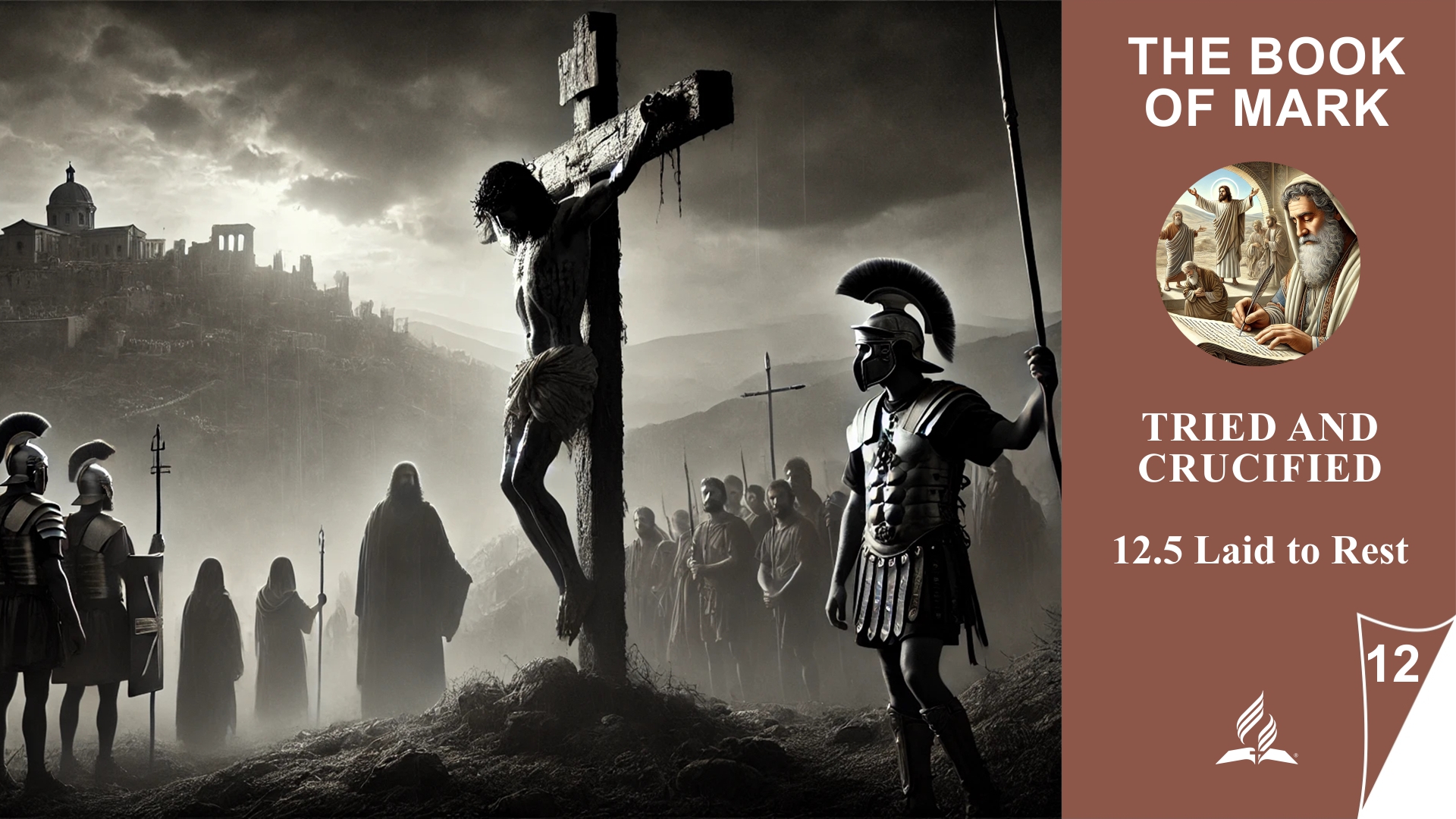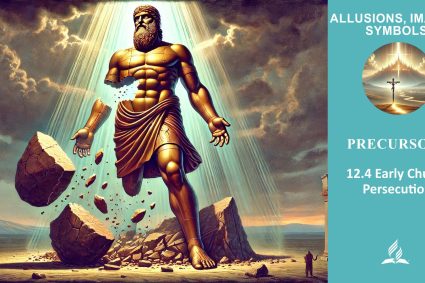


12.5 Laid to Rest
Courage and Testimony: Joseph of Arimathea and the Women at the Tomb
Read Mark 15:42–47. What does the intervention of Joseph of Arimathea mean, especially since Jesus’ disciples are nowhere to be seen?
In Mark 15:42–47, the intervention of Joseph of Arimathea is described as a pivotal moment in the burial of Jesus. It is noteworthy that Joseph, a respected member of the Sanhedrin, the Jewish leadership council, musters the courage to take responsibility for Jesus’ body. This occurs at a time when the disciples, who had trusted Jesus, have disappeared out of fear.
-
The Courage and Dedication of Joseph of Arimathea
Joseph of Arimathea demonstrates great courage by publicly identifying himself with Jesus, despite the danger this posed as a member of the Sanhedrin. In the midst of widespread rejection and persecution of Jesus, he dares to approach Pilate and request Jesus’ body. This shows that true discipleship often requires courage, especially when others withdraw. Joseph thus becomes a role model for us, who are called to stand up for our faith and justice in difficult moments, even when we stand alone.
-
The Absence of the Disciples
The fact that Jesus’ disciples are nowhere to be seen while Joseph of Arimathea takes care of the burial underscores the depth of their fear and despair. However, it also shows that God often uses unexpected people to fulfill His plans. In this case, it is a member of the council who respectfully handles Jesus’ body while His closest confidants hide in fear. This reminds us that God calls upon individuals to do His will even in the darkest times—often those we least expect.
-
The Confirmation of Jesus’ Death
A central historical detail is the confirmation of Jesus’ death by the Roman centurion, who reports to Pilate that Jesus had indeed died. This is crucial as it refutes any theories that Jesus did not actually die but merely became unconscious. The precision with which the Romans carried out executions leaves no doubt about His death. This testimony supports the credibility of the resurrection, as only a truly dead person could rise again.
-
The Role of the Women as Witnesses
The mention of Mary Magdalene, Mary the mother of Joseph, and Salome is also significant. These women, who had witnessed the crucifixion, later become the first witnesses of the empty tomb and Jesus’ resurrection. Their presence shows that, although they did not take center stage in the narrative, they were faithful and crucial witnesses to the central event of Christian history. This highlights the importance of women in the early church and demonstrates that God often works through those who remain faithful in the background to accomplish great things.
Conclusion
Joseph of Arimathea’s intervention is an act of courage and faith in a time of darkness and fear. While the disciples withdrew, he stepped forward to honor Jesus with a proper burial. His actions demonstrate that God calls upon people in critical moments to fulfill His plans, even when they are unexpected. The women who become witnesses of the empty tomb further exemplify that God’s story is often carried by those who remain faithful in the background, yet play pivotal roles.
What an irony that Jesus’ followers “disappeared” while a member of the Sanhedrin—the very council that condemned Jesus—becomes a “hero.” How can we be sure that we, too, will not be “missing” in crucial times?
The irony that Jesus’ closest followers vanished at critical moments, while a member of the Sanhedrin—the council that condemned Him—has the courage to care for His body, is a powerful reminder that human weakness can overwhelm us in the most important moments. Joseph of Arimathea, who was not among the disciples, becomes an unexpected hero, while Jesus’ actual confidants hide in fear.
How can we be sure that we, too, will not be “missing” in crucial times?
-
Deeply Rooted Faith
A strong faith gives us the strength to remain steadfast in difficult moments. Jesus’ disciples were overwhelmed by fear and despair because they did not fully understand the significance of what was happening. A deep faith helps us hold onto God’s plan even in times of uncertainty. Through prayer, reading Scripture, and cultivating a close relationship with God, we can ensure that our faith remains strong when we are challenged.
-
Developing Courage and Determination
Joseph of Arimathea showed great courage by standing firm in his faith in a dangerous situation. Courage is not something that suddenly appears; it develops through conscious decisions in our daily lives to bear witness to our faith, even in small matters. When we are bold in our everyday actions, whether it involves our testimony or moral decisions, it becomes easier to act courageously in larger trials.
-
Avoiding Complacency and Self-Reliance
The disciples relied heavily on the assumption that they could follow Jesus, but in the hour of trial, they abandoned Him. This shows that we should never become too complacent but must practice humility and dependence on God’s strength daily. Spiritual vigilance and awareness of our own weaknesses are essential to prevent failure in crucial moments.
-
Seeking Support in Community
An important lesson from the disciples’ disappearance is the necessity of community. When we are alone in difficult times, we are more susceptible to fear and withdrawal. Engaging with fellow believers can encourage us and remind us to stand firm together. In community, we find strength when our faith is tested.
-
Praying for Guidance and Strength
Finally, prayer is essential to avoid being “missing” during times of trial. Jesus Himself prayed before His arrest and encouraged His disciples to pray so that they would not fall into temptation. In prayer, we find the strength to endure trials and ask God for the wisdom to act rightly.
Conclusion
To ensure that we are not “missing” in the crucial moments of our faith, we must grow daily in our faith, develop courage, guard against complacency, nurture community, and remain steadfast in prayer. By relying on God and asking Him for strength, we can remain steadfast in difficult times and act with the courage and faithfulness exemplified by Joseph of Arimathea.
The connection between the story of Joseph of Arimathea and our daily lives as well as our faith lies in the themes of courage, dedication, and faithfulness, even in difficult times.
-
Courage to Stand Up in Challenging Moments
Joseph of Arimathea acted courageously in a time when it was dangerous to identify with Jesus. In our daily lives, there are also moments when we face the challenge of standing up for our faith, even when it is unpopular or risky. We can learn that true faith often requires courage, especially when others withdraw or remain silent.
-
The Importance of Faithfulness in Small and Great Matters
While the disciples disappeared out of fear, Joseph remained faithful in caring for Jesus’ burial. Often, our faith does not require just courage in significant moments but also in everyday acts of faithfulness. The way we act in the “small things” of our lives shapes our ability to act boldly in crucial moments.
-
God Uses Unexpected People
Joseph, who was part of the council that condemned Jesus, becomes a key figure in Jesus’ burial. This shows us that God often uses unexpected people to fulfill His will. In our faith lives, we should not underestimate ourselves but trust that God can use us in unexpected ways to do good.
-
The Role of Women in God’s Plan
The women who followed Jesus to the tomb, despite often being marginalized in that society, became crucial witnesses to the resurrection. This story teaches us that even those who serve quietly in the background play essential roles in God’s plan. It is a reminder that every service, no matter how insignificant it may seem, is valuable in God’s eyes.
-
Acting Despite the Absence of Others
Joseph of Arimathea acted even though the disciples were not present. This reminds us that in our faith lives, we often face decisions that we must make alone. Our faith should not depend on the support of others but be deeply rooted in our trust in God, allowing us to act courageously even in times of solitude or isolation.
Conclusion
Joseph of Arimathea’s courage and dedication encourage us to stand up for our faith in our own lives, even when it is risky or we stand alone. The women at the tomb remind us that those who serve quietly are essential to God’s plan. This story teaches us that our faith calls us to act boldly and faithfully—in both significant and everyday matters—and that God often uses us unexpectedly to fulfill His plan.
Courage is often shown by standing up for what is right even when no one is watching or supporting us.
(Visited 17 times, 1 visits today)






















